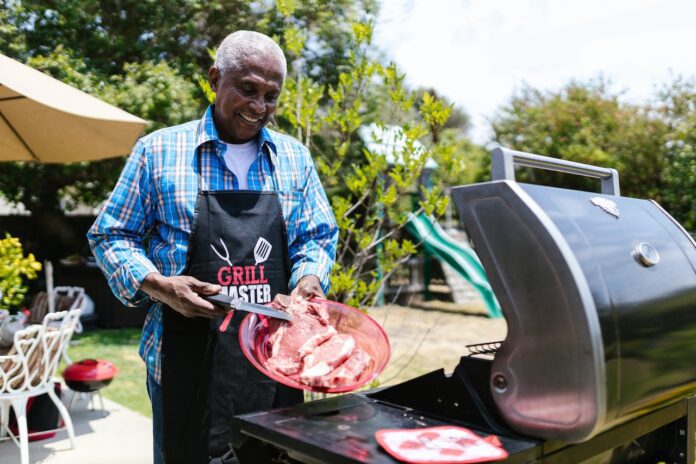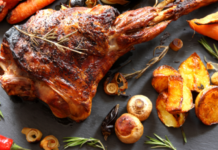Grilled and smoked meats have fans, but you may have wondered what separates them. While both grilling and smoking utilize heat to prepare meat, each technique has its benefits and drawbacks that may make one or the other preferable, depending on the circumstances. If you’re searching for a fast and easy supper or a leisurely and smoky BBQ feast, knowing the distinctions between grilling and smoking will help you choose the correct method. Different heat sources, cooking times, flavors, moisture levels, cuts of meat, and even tools are discussed as some of the main distinctions between grilling and smoking.
Reasonable Heat Generation
One of the main distinctions between grilling and smoking is the manner of generating heat. When meat is grilled, it is cooked rapidly at high temperatures by being subjected to direct heat from a gas or charcoal flame. Searing and crisping the exterior of meats like steaks and burgers is a breeze with this direct heat. In contrast, smoking relies on the indirect heat of burning wood or charcoal.
Smoke can permeate the meat and give it a distinctive flavor at the lower temperatures this method achieves. Large chunks of meat, such as brisket or ribs, can be cooked using indirect heat, even if they are better for grilling. Knowing the difference between grilling’s fast and intense heat and smoking’s gradual and intense heat will help you select the best cooking method for your next meal.
Preparation and Cooking Time
The grilling and smoking processes take very different amounts of time to complete the cooking process. Compared to smoking, grilling typically takes just a few minutes to an hour to prepare most types of meat. As a result, grilling is an excellent choice for individuals who need a simple and fast cooking method.
However, smoking takes longer, with some meats needing to smoke for many hours or even a whole day. This is the way to go if you want to relax and take your time during the cooking process. Time is essential when deciding on a cooking method, whether you like the fast and easy grill or the low and slow smoke.
Flavor
There is no comparison between grilling and smoking when it comes to flavor. A charred and somewhat smoky flavor is transferred to the meat during the grilling process, which can be
accentuated using marinades and seasonings. However, when meat is smoked, it absorbs a deep, smoky flavor from wood smoke that varies with the type of wood utilized. This process can impart a milder, sweeter flavor to the meat, making it a good base for rubs and sauces.
The versatility of smoking over various kinds of wood, such as hickory, mesquite, or Applewood, allows for a greater range of flavor profiles. When determining whether to grill or smoke your next dinner, it’s crucial to think about the resulting flavor. Grilled meat has a strong, charred flavor, while smoked meat has a deep, smoky flavor.
Moisture
Grilling and smoking are two methods that can help keep meat’s natural juices intact when cooking. Smoking prevents the meat from drying out because the smoke can permeate the meat throughout the long cooking phase. Wrapping the meat in foil before smoking is one method for achieving extra-juicy, tender results. It can be challenging to keep the meat juicy when grilling, though, especially if you use a leaner cut.
Meat overcooked or cooked at a high temperature can become tough and chewy, ruining the meal. Grilling, on the other hand, can yield juicy and tasty meat with the use of marinades, basting, and careful attention to the cooking time and temperature. In the end, keeping moisture is the most important factor in making it juicy and flavorful whether you grill or smoke your meat.
Different Cuts of Meat
The choice between grilling and smoking might also be influenced by the kind of meat you want to prepare. Chicken breasts and pork chops, which are relatively lean cuts of meat, benefit greatly from being grilled because this cooking method allows them to be done quickly without being overly dry. Vegetables, shellfish, and other delicate dishes can also be cooked to perfection in this method.
However, meats with more fat, such as brisket, hog shoulder, and ribs, are ideal for smoking. The fat renders throughout the prolonged cooking time and low heat, making for tender, luscious meat. The method’s smoky flavor complements heartier, richer portions of meat as well. The best way to achieve the desired finish when grilling or smoking meat depends on the type of meat being cooked.
Equipment
There can also be a big difference in the tools needed for grilling versus smoking. A wide variety of grilling equipment is available, from the most straightforward charcoal barbecue to the most sophisticated, feature-packed gas grill. Indirect heat cooking is possible with pellet grills, opening the door to smoking techniques. In contrast, a smoker or a grill with a built-in smoker box is necessary for smoking.
Electric, gas, charcoal, and wood-fired smokers are just some options. Digital thermometers and temperature controls are standard on certain modern smokers, allowing for pinpoint cooking. Purchasing a dedicated smoker may be necessary depending on the available resources and the smoker’s level of dedication. Regardless of the grill or smoker you use, you can prepare and enjoy a wide range of tasty foods in their special ways.
Conclusion
Grilling and smoking are two distinct methods for preparing and enjoying meat, each with its benefits and drawbacks. Smoking is ideal for fatty pieces of meat and provides a rich, smokey flavor that can’t be recreated by any other cooking method. At the same time, grilling is quick and easy for cooking leaner cuts of meat, vegetables, and seafood. Whether hosting a summer barbeque or making supper for the family on a weeknight, knowing the key distinctions between grilling and smoking can help you select the optimal cooking method.
Help keep news FREE for our readers
Supporting your local community newspaper/online news outlet is crucial now more than ever. If you believe in independent journalism, then consider making a valuable contribution by making a one-time or monthly donation. We operate in rural areas where providing unbiased news can be challenging. Read More About Supporting The West Wales Chronicle
























